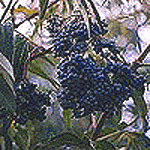|
|
The Eclectic Physician
Medicinal Herb Monographs
Elderberry/Black Elder
Botanical Name
Sambucus nigra
|

Sambucus nigra
(Elderberry and Flower)
|
The information on this page compiled by
Beth Burch N.D.
Index
(click on the keywords)
Introduction
Elder flowers have been traditionally used to treat colds, coughs, fevers,
and congestion of the ears and sinuses. Elder flowers were at one time
part of the US pharmacopoeia. Weiss’ Herbal Medicine recommends elderberry
juice for rheumatism and neuralgia. The berries have been shown in recent
research to be antiviral, assisting with colds and influenza.
[ Back to the Index. ]
Description
-
The black elder is a small tree or shrub up to 15 feet tall and is native
to Europe. A related species, Sambucus canadensis is native to the US.
A member of the Caprifoliaceae family, it has smooth pinnate leaves and
large flat cymes of small yellowish-white flowers. The berries are a dark
purple-blue with a reddish-purple juice. Both the flowers and the berries
are used medicinally. Caution: Do not confuse the black elder with the
red elder which is toxic.
[ Back to the Index. ]
Constituents
-
Flavonoids including quercitin, rutin and anthocyanidins
-
Caffeic acid derivatives
-
Volatile oils
[ Back to the Index. ]
Action/Effects
-
Flowers-
-
Anti-inflammatory (1)
-
Diaphoretic (induces perspiration)
-
Promotes mucus secretion
-
Berries-
-
Antiviral (2)
-
Antioxidant
-
Mild laxative
[ Back to the Index. ]
Conditions used
for
Flowers-
Fevers
Cough
Ear and sinus congestion
Berries-
Influenza(2)
Colds
[ Back to the Index. ]
Dosage
-
Flowers-
-
Liquid extract- 1/4-1/2 teaspoon three times a day.
-
Tea- 2 teaspoons dried flowers to a cup of boiling water, steep and drink
three times a day.
-
Berries-
-
Liquid extract- 1 teaspoon three times a day
-
Children’s dosage- Multiply adult dosage times the child’s weight, then
divide by 150.
-
Food uses
-
Elderberries are used to make wine, jam and pie. Elder flowers are also
used to make a juice or wine.
[ Back to the Index. ]
Side Effects
-
Diarrhea, nausea and vomiting with high doses of the berries
[ Back to the Index. ]
Contraindications
[ Back to the Index. ]
Interactions
with medications
[ Back to the Index. ]
Use in
pregnancy & lactation
-
No information on the safety of use in pregnancy or lactation
[ Back to the Index. ]
References
1. Mascolo N et al, Biological screening of Italian medicinal
plants for anti-inflammatory activity, Phytother Res 1987;1:28-31
2. Zakay-Rones Z et al, Inhibition of several strains of influenza
virus in vitro and reduction of symptoms by an elderberry extract (Sambucus
nigra L.) during an outbreak of influenza B Panama, J Altern Complement
Med 1995;1(4):361-9.
[ Back to the Index. ]
* The information presented in this web site is intended to inform and educate.
It is not intended replace a qualified medical practitioner to diagnose or treat medical conditions.
|
|

